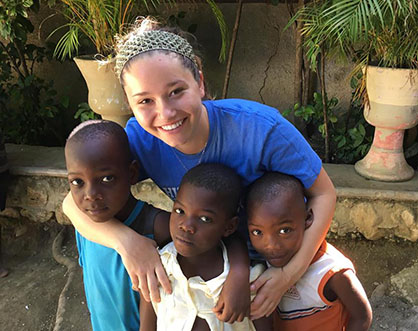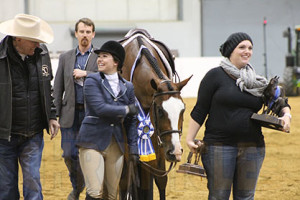Love Thy Neighbor: AQHA Amateur Meghan Tierney Battles Poverty in Haiti
Many in the industry will be familiar with the name of an Amateur Hunter Under Saddle rider and highly sought after braider on the AQHA show circuit, Meghan Tierney of New Jersey. In fact, we had the opportunity to chat with Meghan at the 2016 All American Quarter Horse Congress when she rode Pretty Assets to win the 3-Year-Old Non Pro Hunter Under Saddle and 3-Year-Old Limited Non Pro Hunter Under Saddle.
While she is a multiple Congress Champion-earning equestrienne and purveyor of some of the sharpest mane and tail braids on the circuit, you might not know that she has a passion for philanthropy and the plight of those living in some of the harshest conditions in the world.
“I’ve always been involved with philanthropy, and I love being hands on,” she says. “I’ve been a philanthropic coordinator, counselor, and manager in the past. I was recently a panelist speaker at a New Jersey philanthropy conference.”
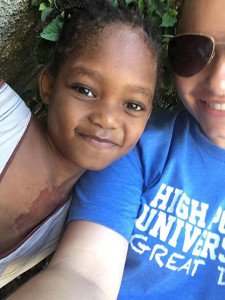 One year ago, when Meghan was serving in a management position at a battered women’s and homeless family shelter, she was asked to apply for a Red Cross program that’s affiliated with the USAID. While most people are familiar with the Red Cross, a lesser known organization is the USAID, or the United States Agency for International Development. Created by President John F. Kennedy by executive order in 1961, the USAID seeks to protect human rights, improve global health, promote economic prosperity, strengthen democracy, further education, help societies recover from conflict, and provide humanitarian aid in over 100 countries around the globe.
One year ago, when Meghan was serving in a management position at a battered women’s and homeless family shelter, she was asked to apply for a Red Cross program that’s affiliated with the USAID. While most people are familiar with the Red Cross, a lesser known organization is the USAID, or the United States Agency for International Development. Created by President John F. Kennedy by executive order in 1961, the USAID seeks to protect human rights, improve global health, promote economic prosperity, strengthen democracy, further education, help societies recover from conflict, and provide humanitarian aid in over 100 countries around the globe.
After being notified that she had been accepted for the team, Meghan packed her bags and headed to Fond Blanc, Haiti. “Earlier this year, I was notified that I was chosen. It was such an honor. We were based out of a huge orphanage in Fond Blanc. We worked in multiple villages surrounding it and up the coast of Cazalle. There was a team of 10 of us sent. Each of us had specific jobs, such as water restoration, construction, medicine, etc. I was sent to teach primary math and to serve as a childhood trauma counselor. I taught classes and aided many victims of the political conflicts and sex trafficking.”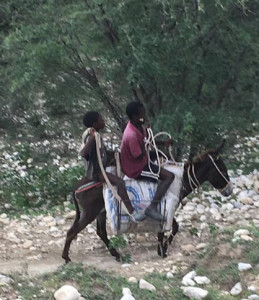
For most, being a first hand witness to some of the poorest living conditions on the planet might be jarring. But for Meghan, who has a background with similar non-profit organizations, she was able to have empathy for the local inhabitants while, at the same time, not let the extreme conditions distract her from the good work she was sent there to accomplish.
“None of what I saw was a shock to me, probably because I’ve seen terrible things here in the states as well, but it was poverty, crime, and abuse to an elevated level. There were children eating dirt, FGM (female genital mutilation), and streets full of feces (both human and animal). It was poverty on top of poverty.”
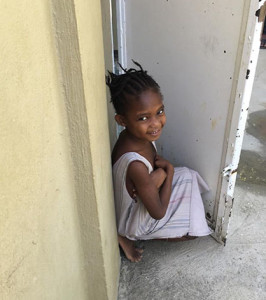 “This trip made me excited to continue serving abroad. It was nice that I’m already pretty desensitized to many horrific things I’ve seen in the past, because I feel that would have gotten in the way of a lot of my work. By working with so many non-profit organizations, I’ve learned that there will always be someone hurt, hungry, and dying. There’s always a need for relief programs.”
“This trip made me excited to continue serving abroad. It was nice that I’m already pretty desensitized to many horrific things I’ve seen in the past, because I feel that would have gotten in the way of a lot of my work. By working with so many non-profit organizations, I’ve learned that there will always be someone hurt, hungry, and dying. There’s always a need for relief programs.”
For the majority of Americans, especially those blessed to be involved in the horse industry, the type of extreme poverty that’s commonplace in Haiti is simply unfathomable. However, there are ways to help that don’t necessarily involve joining a mission trip or traveling halfway across the globe. 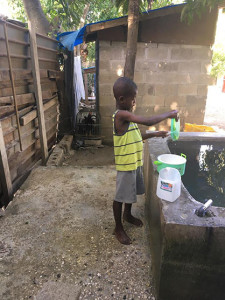
“People can donate to relief programs and call their local congressmen to encourage them to keep funding and refund the programs that have recently been cut from the budget,” she says. “I saw first hand that it does take away basic aid from those who need it, and we are such a blessed country. We can afford to love thy neighbor. From what I saw, hunger, healthcare, poverty, and human trafficking are the largest issues we faced head on.”










